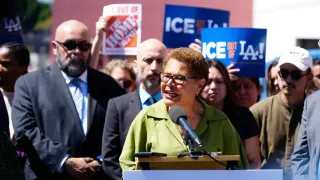
8 hours ago
If Obergefell Falls, So Might Marriage Equality in These 31 States
READ TIME: 3 MIN.
On June 26, 2015, the U.S. Supreme Court issued a historic ruling in Obergefell v. Hodges, finding as unconstitutional state-level bans on same-sex marriage under the provisions of the Fourteenth Amendment. The decision mandated that all states must both license and recognize marriages between same-sex couples, effectively legalizing marriage equality nationwide . Prior to Obergefell, a patchwork of state bans and limited-recognition laws left millions of LGBTQ+ Americans without the protections and dignity of marriage.
The ruling was momentous not only for its legal impact but for its affirmation of LGBTQ+ dignity, as Justice Anthony Kennedy wrote, “Their hope is not to be condemned to live in loneliness, excluded from one of civilization’s oldest institutions. They ask for equal dignity in the eyes of the law” .
A decade later, Obergefell stands on potentially precarious ground. Recent filings—including a high-profile petition by Kim Davis, the former Kentucky clerk who refused to issue marriage licenses to same-sex couples—have formally asked the Supreme Court to reconsider the precedent set by Obergefell .
The current composition of the Supreme Court, with a 6-3 conservative majority, has led to renewed apprehension among LGBTQ+ advocates and legal scholars. While the Court has not yet agreed to hear a direct challenge, the possibility is no longer seen as remote, especially as several justices have openly criticized the Obergefell decision in past dissents for “creating serious questions about religious liberty” and lacking “a basis in the Constitution” .
If the Supreme Court were to overturn Obergefell, marriage equality would not automatically remain the law of the land. In fact, 31 states still have constitutional amendments or statutes on the books that ban or restrict marriage for same-sex couples—laws that were rendered unenforceable by the 2015 ruling but have never been repealed . Should Obergefell fall, those bans could become enforceable immediately, stripping away marriage rights for millions of LGBTQ+ Americans.
The implications are profound: marriage licenses could be denied, spousal benefits revoked, and vital legal protections for families threatened. As of 2025, 22 states and Washington, D.C., have their own marriage equality protections in place, but the rest would revert to their pre-2015 bans unless state legislatures act .
The passage of the Respect for Marriage Act in 2022 provides a partial backstop. The law mandates that all states and the federal government must recognize any legal marriage performed in another state, regardless of the couple’s sex, race, ethnicity, or national origin .
However, legal experts emphasize that this does not guarantee the right to marry in every state. If Obergefell is overturned, couples in states with active bans may be forced to travel to pro-equality states to marry, creating significant financial and emotional burdens—especially for those raising children or facing health emergencies .
According to the Williams Institute at UCLA Law School, there are an estimated 823,000 married same-sex couples in the United States, including nearly 600,000 who wed after the Supreme Court decision in 2015 . Almost one in five of these couples is raising a child under 18.
For these families, the threat of losing marriage rights is not abstract. It could mean losing legal parentage, health insurance, hospital visitation rights, inheritance, and joint adoption protections. While some states have acted to enshrine marriage equality into state law, many legislatures in states with old bans remain gridlocked or hostile to queer rights.
The potential for a rollback has galvanized queer communities and allies nationwide. Pride marches in 2025 have featured calls to defend marriage equality, with renewed emphasis on intersectionality and solidarity with other groups facing attacks on civil rights .
While the Supreme Court has not yet agreed to rehear Obergefell v. Hodges, the threat underscores the fragility of civil rights gains that many had come to see as permanent. Legal experts note that the uncertainty has already led to a surge in couples seeking to marry, update legal documents, and secure parental rights while protections remain in place.






